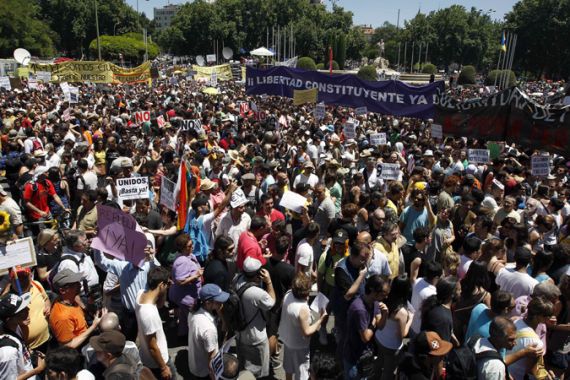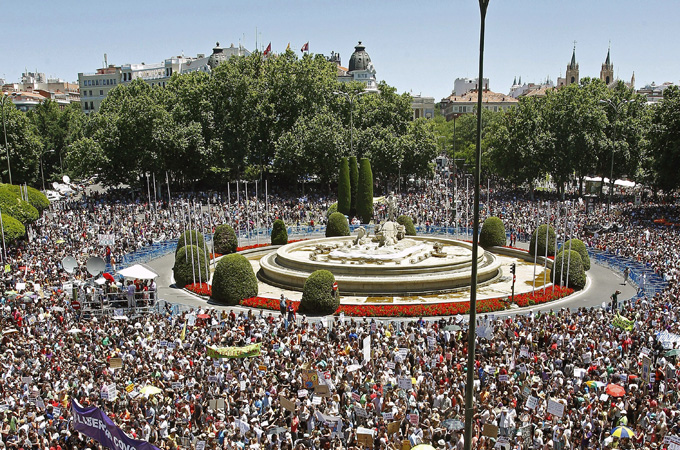Spaniards protest against economic cuts
More than 35,000 take to the streets against euro zone austerity package, demanding politicians change tact.

 |
| Thousands filled the streets of Madrid to protest against spending cuts [EPA] |
Tens of thousands of people have taken to the streets of Spain to march against the mishandling of the country’s economic crisis.
Protesters came out in force throughout the day on Sunday in Madrid, Barcelona, Valencia and Seville.
The demonstrators have largely concentrated on the “Euro Pact”, agreed by euro zone politicians to stimulate competitiveness across the bloc, which has prompted reforms to give Spanish companies greater power to hire and fire.
In Madrid, Spain’s capital city, marches began at six locations around the city. One at 6am (0400 GMT) from Leganes, 13km from the city’s centre later convened at the Neptune plaza in front of the Prado art museum, a stone’s throw from the parliament building, where demonstrators were met by various forms of police resistance, including 12 vans blocking several major roads.
At 1200 GMT, police put estimates in Madrid at between 35,000 and 45,000 protesters, with no reports of violence, according to national radio.
Later on, an estimated 50,000 people in Barcelona shouted, “The street is ours. We are not going to pay for their crisis,” as they marched through Spain’s second largest city.
Earlier in the day, Barcelona demonstrators posted warnings on the organising group’s Facebook page, saying that government infiltrators may try to incite violence in the protests.
‘Not our fault’
Demonstrations first began before the May 22 regional elections in response to the perceived failure of politicians to represent the electorate, and activists have taken to the streets regularly since then.
Protester Antonio Cortes, 58, said Spain’s workers were being asked to bear the brunt of the financial crisis. ”This crisis was created by the capitalist financial system and we are paying for it. All the cuts shouldn’t be aimed at the working class,” he said.
“I’m here because this is a con,” said Juanjo Montiel, 26, one of four blind protesters in Madrid who works in Information Technology for around 1,000 euros a month.
“I’m lucky enough to have a job, but many don’t and have no chance. And on top of that, the politicians want to make more cuts. This is not our fault – it’s the system.”
Protesters call themselves the “indignados”, meaning the “indignant” or “outraged”.
The political leaders of the euro zone’s fourth largest economy have worked hard to convince investors the country will not follow Greece, Portugal and Ireland in needing a bailout.
Greece has seen major clashes with police over unpopular austerity measures, and protesters have kept up demonstrations for months, while the president has announced a government restructuring amid calls for stepping down.
Spaniards say that while political leaders distance their approach from Greece’s, their own worries are being ignored.
Soaring unemployment
Unemployment has soared to the 21.3 per cent 14-year high, and almost half of the population under-25 is out of work, with 35 per cent of people aged 16 to 29 jobless. It is the highest unemployment rate in the Euro zone.
Banks have cut off credit lines, consumer prices are rising faster than the regional average, investment has been slashed and house prices have plummeted.
Meanwhile, the government has spent the last two years passing bills to keep wage rises to a minimum, raise the retirement age, abolish welfare payments and increase taxes.
Since May, the protests have snowballed.
In Catalonia, which has pledged to cut spending by 10 per cent this year, mass protests in front of Barcelona’s parliament last week forced the region’s president to be helicoptered in to debate where the axe would fall.
“The politicians have to come here and see this,” said Paloma Cirujano, 30, a nurse in Madrid, marching with her three-month-old baby in her arms on Sunday.
“This (movement) has to come to something. It won’t just end here.”